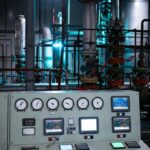Introduction: Artificial intelligence (AI) has emerged as a transformative technology across various industries, and the field of chemical engineering is no exception. With its ability to process vast amounts of data, identify patterns, and make intelligent decisions, AI holds tremendous potential to revolutionize how chemical processes are optimized, products are developed, and safety is ensured. In this article, we will explore the effects of AI on chemical engineering jobs and the implications it has for professionals in the field.
Process Optimization: Enhancing Efficiency and Quality One of the significant benefits of AI in chemical engineering is its capability to optimize processes. By analyzing large datasets and identifying intricate patterns, AI algorithms can optimize parameters such as temperature, pressure, flow rates, and reactant concentrations. This optimization leads to improved efficiency, reduced energy consumption, and enhanced product quality. AI-powered process optimization not only saves time but also increases profitability and sustainability in chemical manufacturing.
Predictive Maintenance: Reducing Downtime and Enhancing Reliability AI-powered predictive maintenance systems are transforming the way equipment is managed in chemical plants. By continuously monitoring sensors and analyzing real-time and historical performance data, AI algorithms can detect anomalies, predict potential failures, and recommend maintenance actions. This proactive approach to maintenance minimizes unplanned downtime, increases equipment reliability, and reduces maintenance costs. Chemical engineers can focus more on strategic tasks rather than reactive maintenance, thereby improving overall plant productivity.
Product Development: Accelerating Innovation and Formulation AI is revolutionizing the development of chemical products and formulations. Through machine learning algorithms, AI can analyze extensive databases of chemical properties, reaction pathways, and material characteristics to suggest novel compounds or optimize formulations based on desired properties. This enables chemical engineers to expedite the discovery and design of new chemicals and materials, leading to faster innovation and improved product performance.
Safety and Risk Assessment: Enhancing Process Safety Safety is paramount in the chemical industry, and AI is playing a vital role in improving safety practices. By analyzing historical data, conducting simulations, and predicting potential hazards, AI can assist in safety and risk assessment. It identifies critical process parameters, highlights potential safety risks, and recommends mitigation strategies. This proactive approach to safety management enhances process safety, reduces accidents, and improves risk management practices.
Data Analysis and Modeling: Leveraging Insights for Better Decision-Making Chemical engineering generates massive amounts of data, and AI techniques can unlock valuable insights from this data. Through data mining, pattern recognition, and machine learning, AI can analyze and interpret data from experiments, sensors, and process monitoring systems. This enables chemical engineers to gain a deeper understanding of processes, develop more accurate models for simulation and optimization, and make data-driven decisions for process improvements.
Automation and Robotics: Enhancing Efficiency and Precision AI-powered robots and automation systems are transforming various aspects of chemical engineering. These systems can perform repetitive tasks with high accuracy and efficiency, such as sample handling, laboratory testing, and process control. By delegating routine tasks to AI-powered machines, chemical engineers can focus on more complex and creative work, driving innovation and productivity in the field.
Supply Chain Optimization: Streamlining Operations The integration of AI into the chemical supply chain offers opportunities for optimization. AI algorithms can analyze data related to procurement, inventory management, logistics, and demand forecasting. This analysis helps minimize costs, reduce lead times, optimize inventory levels, and improve overall supply chain efficiency. Chemical companies can make better-informed decisions, respond to market fluctuations quickly, and ensure timely delivery of products.
Conclusion: Artificial intelligence is revolutionizing the field of chemical engineering, offering immense potential for process optimization, product development, safety enhancement, and overall operational efficiency. While these advancements bring numerous benefits, they also necessitate professionals in the field to adapt their skills and acquire knowledge in AI techniques, data analysis, and machine learning. Embracing AI technologies in chemical engineering requires careful consideration of ethical aspects, data privacy, and cybersecurity. By effectively leveraging AI, chemical engineers can unlock new possibilities, drive innovation, and shape the future of the industry.











